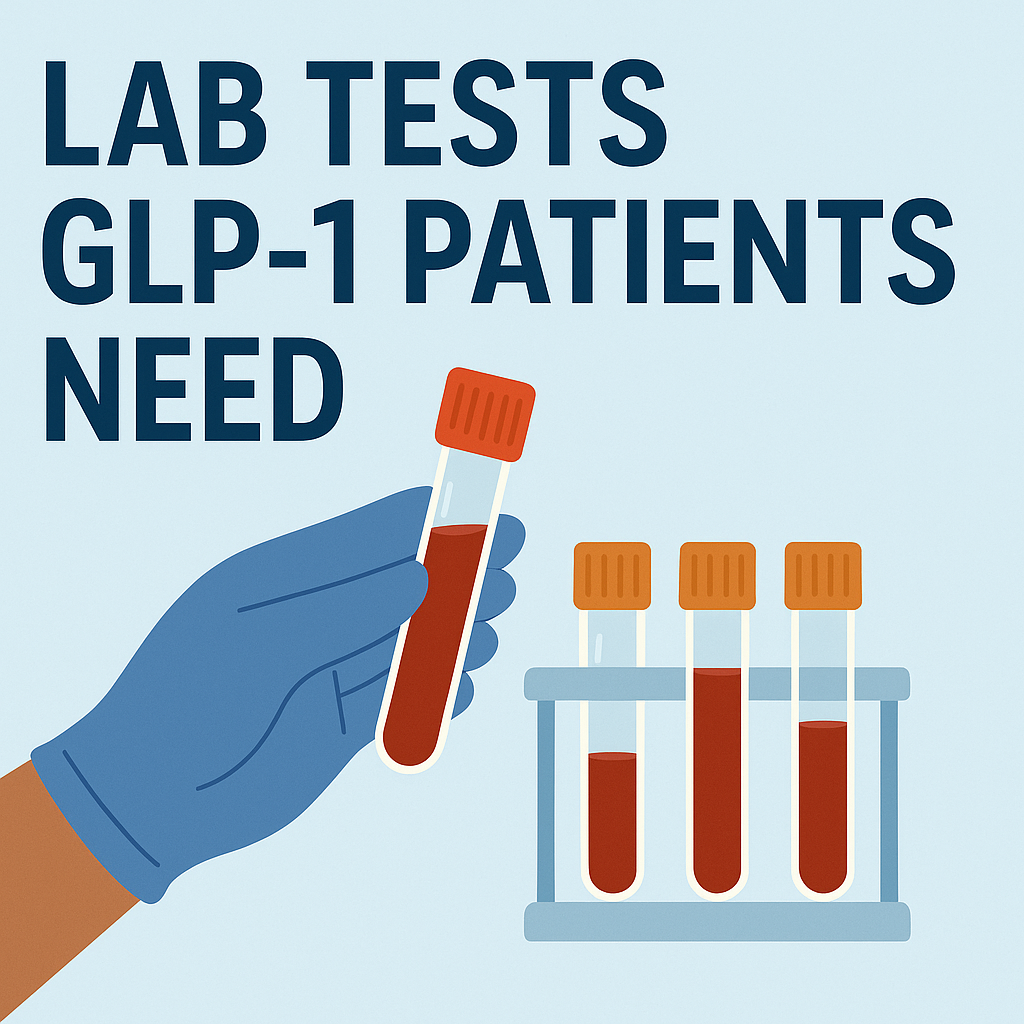Essential Lab Tests for GLP-1 Weight Loss Medications: Your Complete Guide

Monitoring What Matters: Beyond the Scale
The Hidden Side of Medical Weight Loss
The journey with GLP-1 medications like Ozempic, Wegovy, or Mounjaro goes far beyond watching numbers drop on your scale. These revolutionary medications work by fundamentally reshaping your metabolic systems—not just suppressing appetite.
But how do you know they're working properly? How can you ensure your body is responding optimally without developing complications?
The answer lies in your bloodwork.
Laboratory testing reveals the story that your scale can't tell—offering critical insights into how these powerful medications are affecting your entire body.
Why Lab Testing Trumps Scale Measurements
While watching the scale move downward provides satisfaction, your blood work tells the complete story of your health transformation:
Baseline Testing: Your Health Starting Point
Before taking your first dose, comprehensive baseline testing establishes your metabolic "fingerprint." This initial data set:
- Documents pre-existing conditions
- Provides comparison points for measuring improvement
- Often satisfies insurance requirements for continued coverage
- Helps your healthcare provider personalize your treatment plan
Beyond BMI: Measuring Metabolic Health
A surprising truth: Some individuals with "normal" weight struggle with poor metabolic health, while others carrying extra weight show perfect biomarkers.
Your lab values reveal your true metabolic status, showing improvements in:
- Insulin sensitivity
- Inflammatory markers
- Cardiovascular risk factors
- Liver health
These changes often precede significant weight loss, confirming the medication is working even before dramatic scale changes.
Early Warning System for Side Effects
Regular monitoring can detect potential complications before symptoms appear:
- Pancreatitis markers
- Dehydration indicators
- Nutritional deficiencies
- Medication interactions
Your Essential Lab Test Checklist
1. Glucose Metabolism Panel
What to Monitor: HbA1c, Fasting Glucose, Insulin, HOMA-IR
Why It Matters: These markers reveal how your body processes sugar—often the first values to improve on GLP-1 therapy. Decreasing numbers indicate reduced diabetes risk and metabolic improvement.
Red Flags: Watch for blood sugar levels dropping too low, especially if you're also taking other diabetes medications.
2. Liver Function Panel
What to Monitor: ALT, AST, GGT, Albumin, Bilirubin
Why It Matters: Your liver processes medications and manages fat metabolism. Many GLP-1 users see dramatic improvements in fatty liver markers, but monitoring ensures the medication isn't creating strain.
Red Flags: Elevations in liver enzymes require dose adjustment or further investigation.
3. Kidney Function Assessment
What to Monitor: Creatinine, BUN, eGFR
Why It Matters: Your kidneys filter medications from your bloodstream. Proper function is essential during weight loss when your body processes stored toxins.
Red Flags: Declining kidney function may require medication adjustments or increased hydration.
4. Electrolyte Balance
What to Monitor: Sodium, Potassium, Magnesium, Calcium, Phosphorus
Why It Matters: Nausea, reduced food intake, and increased water loss can disrupt these critical minerals essential for heart rhythm, muscle function, and energy production.
Red Flags: Imbalances can cause fatigue, muscle cramps, heart palpitations, or more serious complications.
5. Lipid Profile
What to Monitor: Total Cholesterol, LDL, HDL, Triglycerides
Why It Matters: GLP-1 medications often dramatically improve cholesterol values independent of weight loss. These improvements correlate with reduced cardiovascular risk.
Red Flags: While most users see improvements, monitoring ensures you're following the expected pattern.
6. Thyroid Function (When Indicated)
What to Monitor: TSH, Free T3, Free T4
Why It Matters: Thyroid hormones regulate metabolism and energy. Weight loss can sometimes affect thyroid function, and symptoms of hypothyroidism can mimic medication side effects.
Red Flags: Unexplained fatigue, hair loss, or stalled weight loss despite medication adherence.
7. Nutrition & Inflammation Markers
What to Monitor: Complete Blood Count, Vitamin B12, Vitamin D, Folate, Iron Studies, hsCRP
Why It Matters: Reduced appetite can lead to nutrient deficiencies. Meanwhile, inflammation typically decreases with successful treatment.
Red Flags: Anemia, declining vitamin levels, or persistently elevated inflammation markers.
Optimal Testing Schedule
Your unique health history and medication response determine your ideal monitoring schedule, but these guidelines provide a starting framework:
Before Starting Therapy
Complete baseline panel including all markers listed above to establish your starting point and identify any pre-existing issues.
Early Treatment Phase (4-8 weeks)
Focused monitoring of the most critical values based on your medical history and medication. This timing catches early response patterns and potential side effects.
Dose Adjustment Periods
Targeted testing 4-6 weeks after any significant dose change to ensure your body is adapting appropriately.
Stable Treatment Phase
Comprehensive panels every 3-6 months to monitor ongoing improvements and catch any developing issues.
Leveraging Your Lab Data
Knowledge is power. Bring these questions to your provider when reviewing results:
- "How have my inflammatory markers changed since starting treatment?"
- "Are my improvements consistent with what you'd expect at this stage?"
- "Do any values suggest I need nutritional supplements?"
- "Based on these results, should we adjust my medication dose?"
- "Which markers should we watch most closely at my next visit?"
Beyond the Numbers: The Complete Picture
Remember that lab values represent one piece of your health puzzle. The most successful GLP-1 journeys combine regular monitoring with:
- Consistent hydration
- Adequate protein intake
- Regular physical activity
- Stress management
- Quality sleep
- Professional medical oversight
The Bottom Line
While the scale provides immediate gratification, your lab values offer the roadmap to truly transformative health. Regular monitoring ensures you're not just losing weight—you're gaining metabolic health while avoiding complications.
This article is informational only and doesn't replace personalized medical advice. Always consult your healthcare provider about appropriate testing and medication management.

